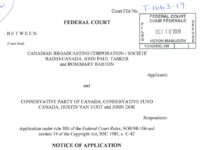In March 2010, Access Copyright filed a tariff proposal with the Copyright Board to cover copying at post-secondary institutions in Canada. The proposed rate was $45 per year per university student and $35 per year per college student. The proposal represented a dramatic increase in the fees paid under the Access Copyright licence, which, when combined with Supreme Court of Canada jurisprudence on fair dealing in the 2004 CCH decision and the growing investment in digital materials, sparked concern among the Canadian education community. In 2012, the Supreme Court of Canada re-emphasized the broad and liberal approach to fair dealing as user’s right and the government would expand the fair dealing purposes to explicitly include education.
The Access Copyright tariff proposal progressed slowly before the Copyright Board, but on Friday, more than nine years after it was first filed, the Board issued its ruling. It established a retroactive tariff for the years from 2011-2014 of $24.80 per university student ($9.54 for college students) and $14.31 per university student ($5.50 for college students) for the years 2015 to 2017. Access Copyright welcomed the decision, arguing that it outlined a reasonable framework for copying in post-secondary institutions.











